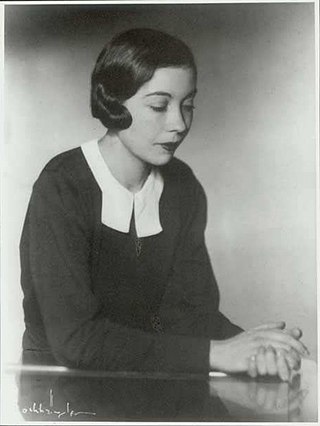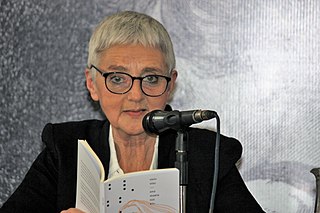Related Research Articles
Chilean music refers to all kinds of music developed in Chile, or by Chileans in other countries, from the arrival of the Spanish conquistadors to the modern day. It also includes the native pre-Columbian music from what is today Chilean territory.
Chilean rock is rock music and its corresponding subgenres produced in Chile or by Chileans. Chilean rock lyrics are usually sung in Spanish so can be considered as part of rock en español, although they are sometimes sung in English as well.

Eduardo Barrios, was a Chilean writer and poet.

San Cristóbal Hill is a hill in northern Santiago, Chile. It rises 850 m AMSL and about 300 m above the rest of Santiago; the peak is the third highest point in the city, after Cerro Manquehue and Cerro Renca. Cerro San Cristóbal was named by the Spanish conquistadors for St Christopher, in recognition of its use as a landmark. Its original indigenous name is Tupahue.

Marcela Paz was the pen name of Esther Huneeus Salas de Claro, a Chilean writer. She also used the pen names of Paula de la Sierra, Lukim Retse, P. Neka and Juanita Godoy. She was a recipient of the National Prize for Literature.

The Viña del Mar International Song Festival is an annual international music festival held every third week of February in Viña del Mar, Chile. Started in 1960 it is the oldest and largest music festival in Latin America, and one of the longest running music festivals in the world. It was cancelled in 2021 and 2022 due to COVID.

The Viña del Mar International Song Festival 2010 was held from February 22, 2010 until Friday February 26, 2010. The musical event was broadcast on Chilean TV channels Televisión Nacional de Chile and Canal 13, and will be held in Viña del Mar, Chile, like the past 50 editions. The show is hosted for the second time by Soledad Onetto and Felipe Camiroaga. For the first time the whole event was broadcast in HD via Canal 13.

Celso Piña Arvizu was a Mexican singer, composer and accordionist, mainly in the genre of cumbia, being one of the most important musicians in the style of "cumbia rebajada".

The Viña del Mar International Song Festival 2011 was released from February 21, 2011 until Saturday February 26, 2011. The musical event was broadcast for first time via Chilean TV channel Chilevisión.
The Latin Brothers is a Colombian salsa group originally led by Julio Ernesto Estrada Rincón, known as 'Fruko'. It was created by Antonio Fuentes of the label Discos Fuentes as a response to the rival salsa groups of the day. Original lead singer Piper Pimienta along with Joe Arroyo and Julio Ernesto Estrada Rincón 'Fruko' carried the launch of the group's success in 1974. It was billed as a sister act to Fruko y sus Tesos on the Discos Fuentes label.
Banda Conmoción are a Chilean ensemble band who mix cumbia and gypsy music with genres such as ska and cha-cha-cha. They are part of the new Latin-American fusion movement and emerged in the early nineties along with groups like Chico Trujillo and La Floripondio. They are also considered part of the New Chilean Cumbia movement.
Combo Ginebra is a Chilean musical ensemble of the New Chilean Cumbia style. The band emerged in 2004 as a traditional gypsy music duo featuring Álvaro Pacheco and Juan Pablo Cabello. The duo soon began incorporating cumbia rhythms into their repertoire and were joined by other instrumentalists to form a cumbia ensemble band.

Norma Monserrat Bustamante Laferte better known as Mon Laferte, is a Chilean and Mexican musician, singer, composer and painter. Her musical style is diverse, spanning across different genres such as pop, rock, bolero, cumbia, and salsa, showcasing her versatility and creativity. Throughout the 2010s, she gained widespread recognition for her melodramatic style and "captivating stage persona".
Sonora Palacios is one of Chile's oldest tropical orchestras. Formed in the early 1960s, the group is one of the main exponents of Chilean cumbia and were pioneers of the style. They were the first Chilean band to record cumbia and are widely recognized for establishing the popularity of cumbia in Chile.

Cumbia is a folkloric genre and dance from Colombia.

Ana María del Río is a Chilean literature professor, feminist writer, and novelist. Her honors include the Santiago Municipal Literature Award and the María Luisa Bombal Award.
Elizabeth Subercaseaux Sommerhoff is a Chilean journalist and writer.

Elisa Pérez Walker, better known by the pseudonym Elisa Serrana, was a Chilean feminist, teacher, and novelist. She was a member of her country's Generation of '50, which also included Marta Jara, Elena Aldunate, Mercedes Valdivieso, and Matilde Ladrón de Guevara.
Música cebolla is a genre of Chilean music emphasising sentimentality and intimacy. Indeed, at times the feelings expressed in música cebolla are "exacerbated". Música cebolla had its heyday in the 1950s and 1960s, and was thus contemporary to Nueva ola, the early Nueva Canción and the introduction of Cumbia to Chile.
Marta Blanco (1938–2020), was a Chilean writer and journalist.
References
- ↑ Juana Fe Archived 2014-04-26 at the Wayback Machine . Musicapopular.cl. Retrieved 21 February 2013.
- ↑ El sueño de la máquina propia [ permanent dead link ]. El Mercurio. 13 July 2010. Retrieved 21 February 2013.
- ↑ Juana Fe Archived 2014-04-26 at the Wayback Machine . Musicapopular.cl. Retrieved 21 February 2013.
- ↑ Callejeros y patiperros chilenos: Juana Fe inicia gira de dos meses por Europa. El Mercurio. 2 June 2011. Retrieved 21 February 2013.
- ↑ Juana Fe participará en Festival de Folklore Argentino. La Tercera. 7 April 2011. Retrieved 21 February 2013.
- ↑ Juana Fe comienza el verano en distintas regiones del país. La Tercera. 10 January 2010. Retrieved 21 February 2013.